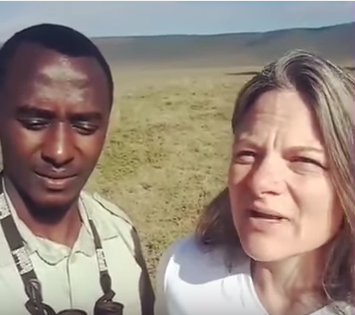Fake news (also called misinformation or lies. Ed.) is a term that has come to prominence recently, even though its dissemination is a far older phenomenon.
The goods and services which could be classed as fake have now been joined by another – “fake translation“. Kenya’s Nairobi News reports that a tour guide at the Serengeti National Park in neighbouring Tanzania has been arrested after incorrectly translating a tourist’s comments about the country and its people from English into Swahili.
The guide is said to have been arrested on unspecified charges on Thursday on the orders of Tanzanian Tourism Minister Jumanne Mghembe.
 In an undated video clip, the tour guide translates what an English-speaking woman is saying and instead of conveying the original message’s meaning, decides to skew the visitor’s kind remarks about country completely.
In an undated video clip, the tour guide translates what an English-speaking woman is saying and instead of conveying the original message’s meaning, decides to skew the visitor’s kind remarks about country completely.
An example is given below.
Visitor: “Hi. My visit to Tanzania has been beautiful and gorgeous. The people are fabulously wonderful and friendly. Greetings are always jambo. I am happy to be here. The land is beautiful, the animals are wonderful.
Tour guide: You Tanzanians complain/cry a lot about hunger. Everyday you cry about hunger when you have flowers at home. Why don’t you boil the flowers and drink [them]. It is not good to cry/complain about hunger.
The minister may have ordered the unnamed guide’s arrest as he felt the guide was either mocking the tourist or mimicking President John Magufuli, as some of the guide’s remarks echoed those used by the president at a rally last month when he called on people to stop complaining about hunger.
Tanzania is popular with tourists due to its wildlife and stunning scenery and markets itself as “The Soul of Africa“.